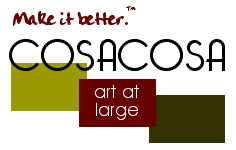



Open dialogue and debate are essential to a democratic society. Yet currently, divisive political discourse poisons the very atmosphere of our civic engagement. As we suffocate in the toxic environment of intractable self-expression, it often seems impossible to find any way out of (much less beyond) it. Perhaps art can provide a breath of fresh air.
For well over three decades, I've experienced art's power first hand; I’ve worked as a professional actor, writer, director, and as a human potential and diversity trainer bringing different ethnic and cultural groups together. Yet two months ago, while working as a collaborator and performer for COSACOSA’s latest Philly Fringe project, The Estate of Real: Changing Philadelphia Neighborhoods, I had an epiphany about the ubiquity of art's influence. As an audience interactive performance, The Estate of Real deftly bridges communication between people of different political/social views -- not by avoiding controversial topics or by proselytizing one position over another, but by addressing difficult issues directly with a creative structure and in a safe forum that promotes authentic dialogue.
Some background: The Estate of Real: Changing Philadelphia Neighborhoods is an interdisciplinary piece using participatory theater, photography, new media, and found objects transformed into art. Three pilot performances were held as part of the 2011 Philly Fringe at COSACOSA’s intimate studio space in Manayunk. The studio was transformed into an imaginary real estate office/art gallery/covert quasi-governmental organization staffed by two “Agents of Change” who each try to convince the customers/audience/visitors to buy into their wildly divergent views on how to transform Philadelphia into a better and more prosperous city. Described in the broadest of strokes, my character comes from a conservative, business-centered perspective, while the other "agent" (played by Sharnae Mask, who also created most of the project's photography) promotes a progressive community empowerment agenda.
Based on a story concept by COSACOSA Director and artist Kimberly Niemela, the piece is rooted in ongoing dialogues with COSACOSA constituents from ten diverse Philadelphia neighborhoods. Further construction of The Estate of Real occurs through improvisation and intense, free-flowing conversations among the participating artists and audiences, including -- most importantly for this essay -- non-urban residents of diverse ideologies. Hot button subjects like crime, poverty, urban blight, taxes, community versus business investment, trickle-down versus trickle-up economics, and more are discussed in appealing and amusing, yet thought-provoking ways. Because The Estate of Real strives to be scrupulously fair in how issues and ideas are presented, the piece engenders frank, congenial, and productive debate among people with widely divergent political and social views.
All my life, I've thought of myself as a “progressive warrior.” For me, the truly remarkable aspect of The Estate of Real experience was finding myself, both during the project's development and performances, engaged in sincere, creative, and empowering discussions among people with whom, because of their perspectives and politics, I never thought that I could find any sort of common ground. Yet, the true dialogue that emerged from our shared art experience allowed us, as a group of concerned citizens, to move from our singular, entrenched positions to a place where we were able to really see, hear, and try to appreciate each other. Because our art-making generated a safe, respectful, and fair space (as well as one that captivated attention and imagination), we felt free to express our true and opposing views to one another -- from a position of good faith and a desire for new understanding. Moreover, we did so with honesty, humility, and humanity.
After our art-based discussions, we felt invigorated and hopeful rather than drained and upset. Armed with new insight by really having listened and really having been listened to, we could treat each other with mutual respect. Though perhaps none of us changed or reversed our positions, we all thought more clearly and critically about our own views and those of others. We were enriched by our civil, civic engagement and ready to find new avenues for cooperation.
(Of course I don’t expect those who are not honest brokers of opinion, who operate in bad faith, or are so extreme or hateful in their political and social views to be amenable to arts-driven creative positive engagement. But I believe that more people than not desire to try to understand and be understood and that most people are welcoming and affirming when these two things to happen.)
I was changed by The Estate of Real experience, having discovered anew art's transformative power. I’m motivated to investigate alternative ways to build on this discovery so that, whether we're Tea Partiers or Wall Street Occupiers, we can engage in a forthright and constructive sharing of ideas with art as the active mediator. The potential synergism of opposites working for a greater good is truly a zephyr of hope, an invigorating possibility in these days of political asphyxiation. So let's all take a deep breath and make space for positive civic exchange -- creatively.
Bruce Robinson has been teaching and performing in Philadelphia for over thirty years. As a theater director, actor and educator, he has held major roles in productions with numerous area companies including InterAct, Novel Stages, and the Wilma Theatre. Robinson has won the Barrymore Award for “Outstanding Community Service in Theater” and the Philadelphia CBS affiliate’s “People Making a Difference” award. Robinson is Founder and Artistic Director of the Fresh Visions Youth Theatre.